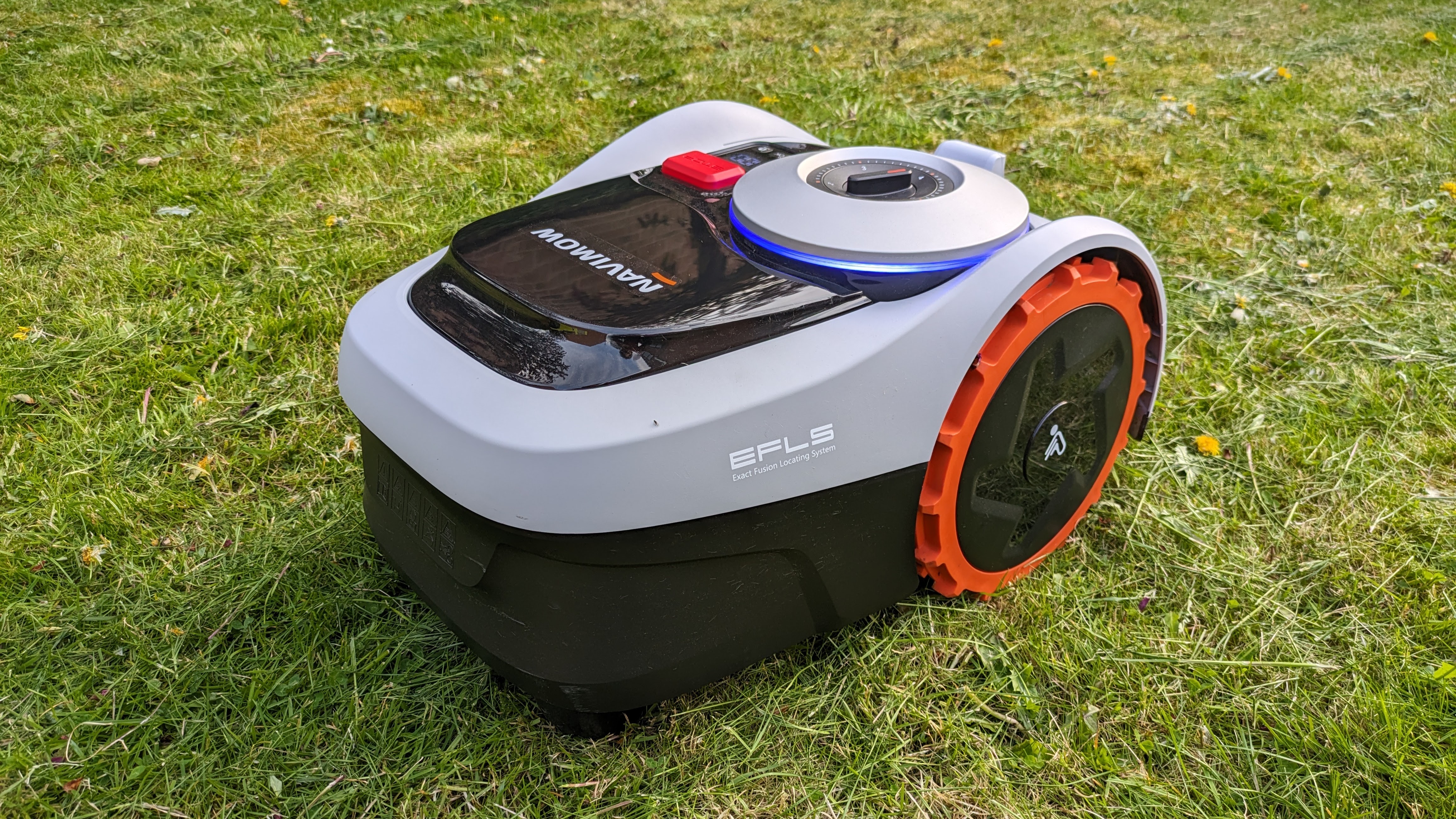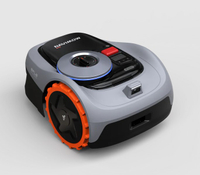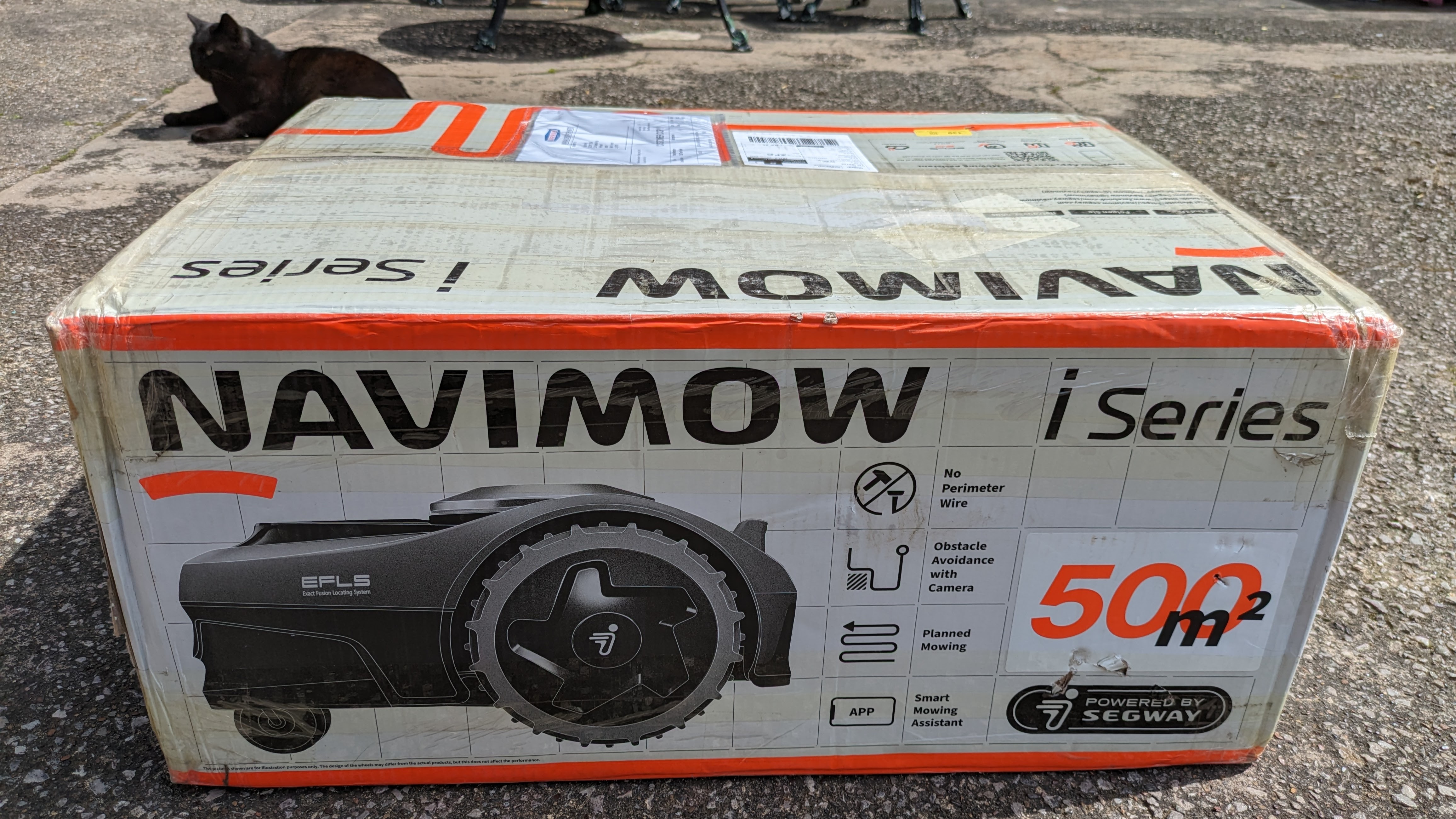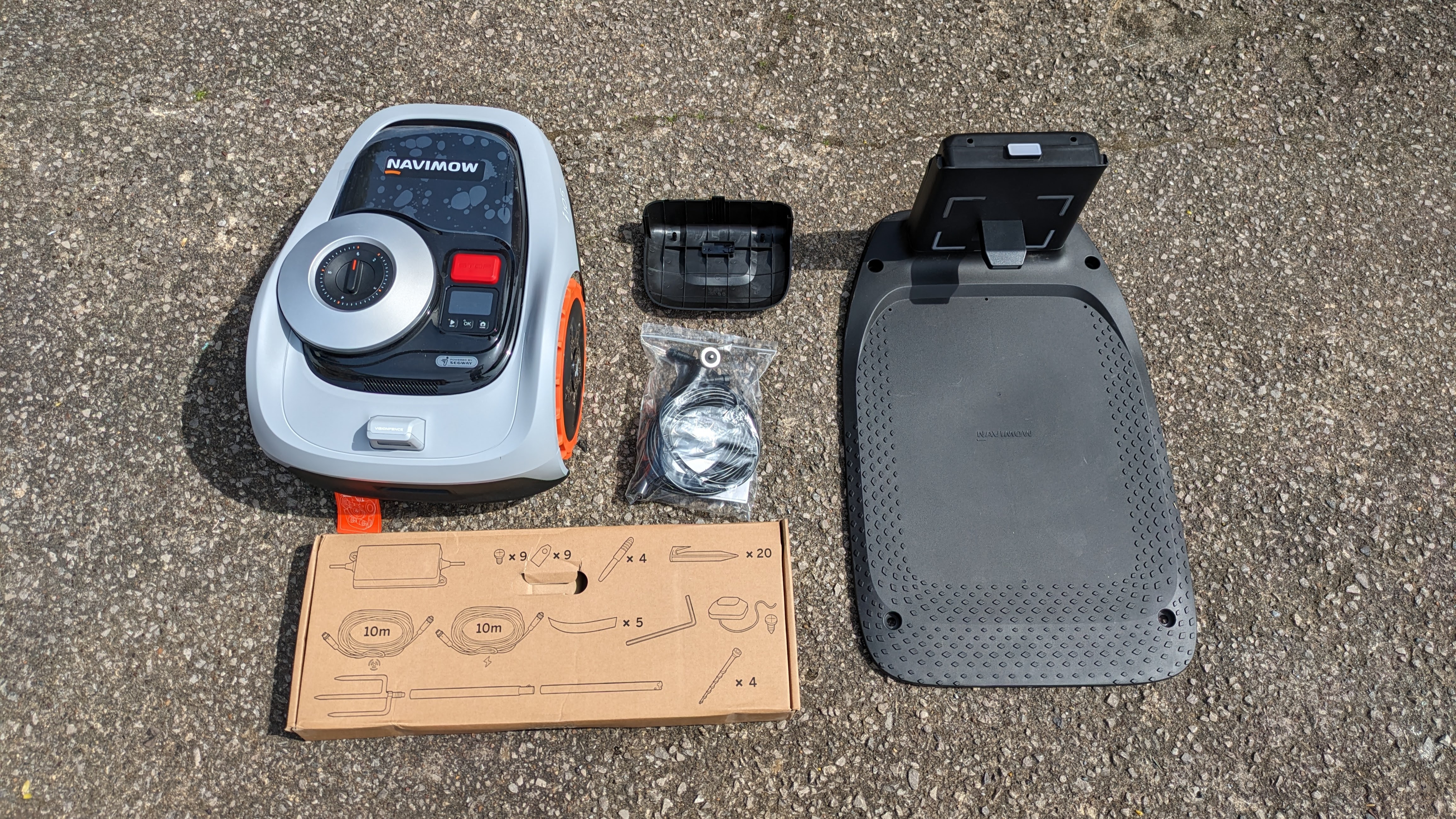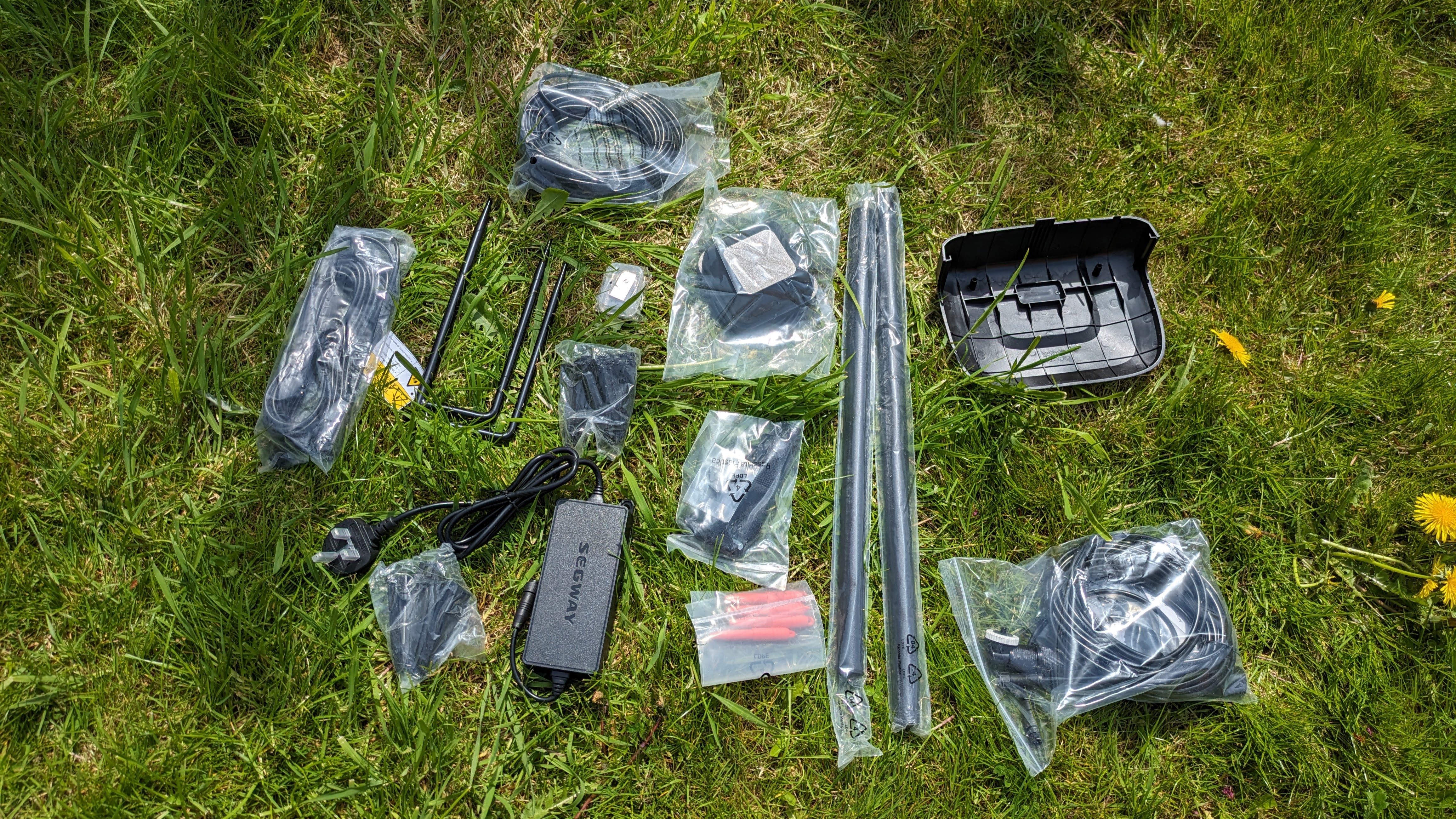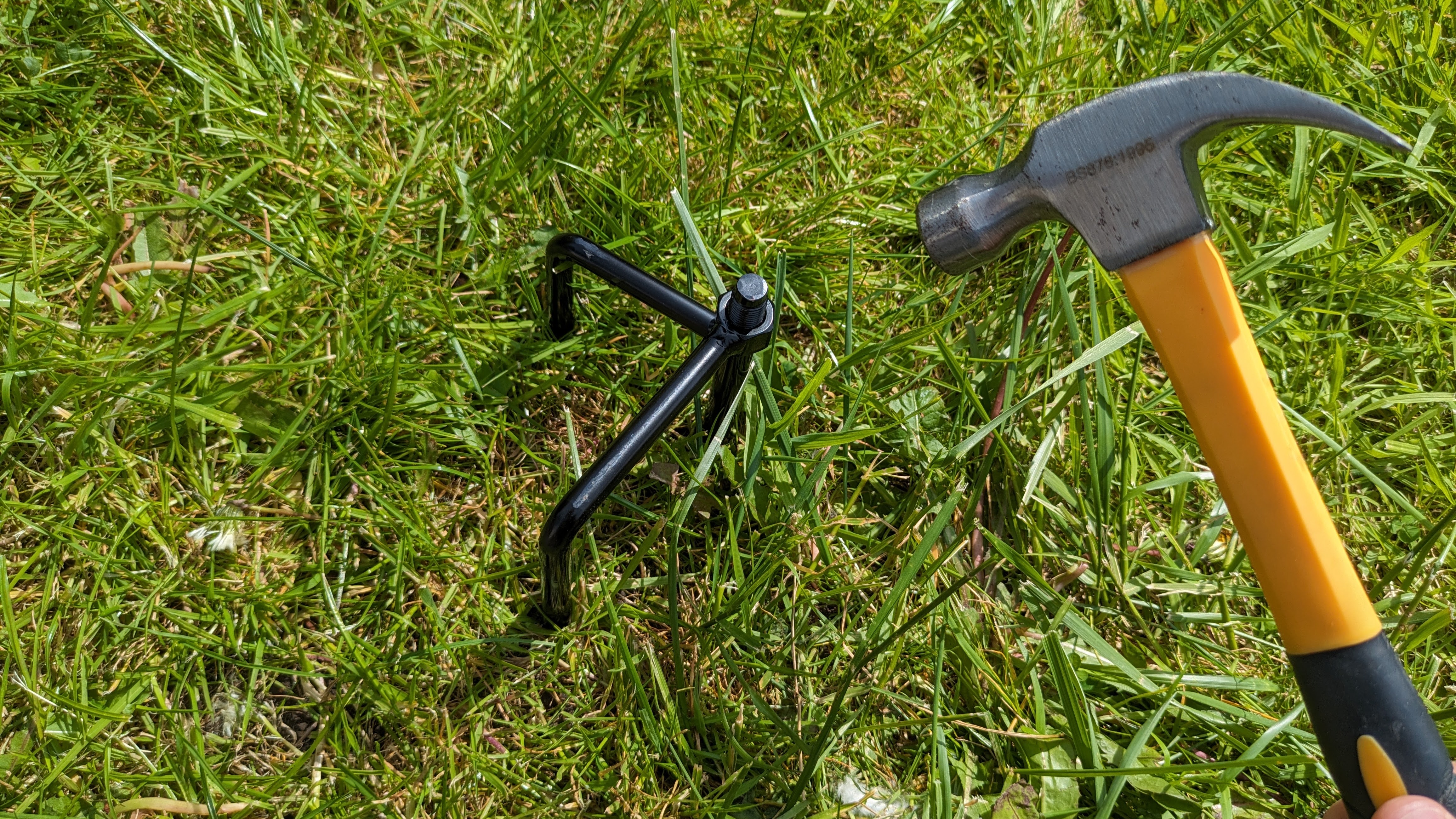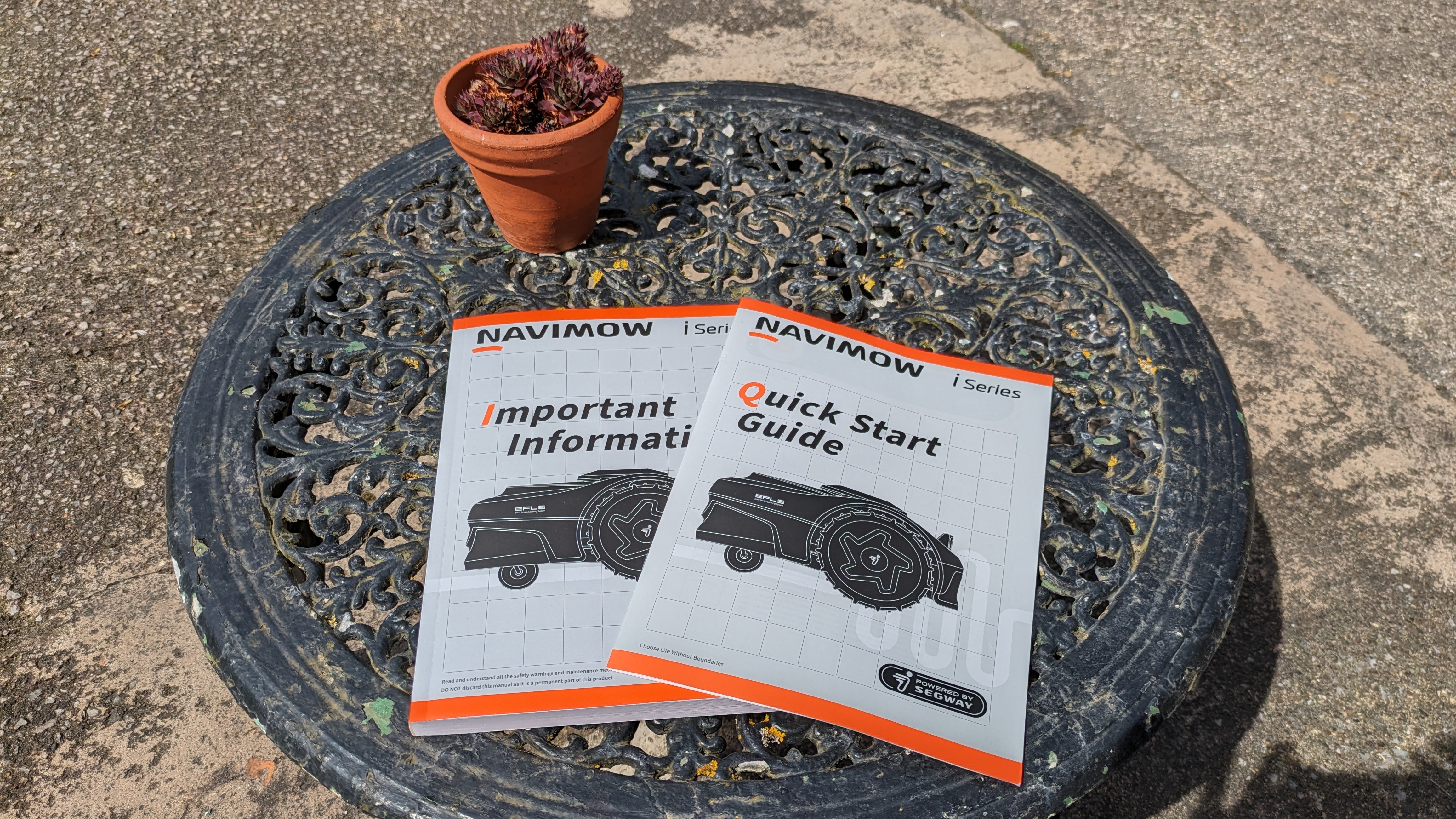Segway launched its new Navimow i Series robotic lawn mowers, including the hotly tipped Navimow i105N, just a few months back. I’ve reviewed a fair few robotic mowers in my time, and I felt these new models could shake up TopTenReviews’ ranking of the best robot lawnmowers. So, I got straight in line to write a hands-on review.
One of the i105N's really interesting selling points is that it works without a perimeter wire, relying instead upon a GPS antenna for navigation. That could mean a big improvement in setup time and flexibility—especially compared to alternative models where the perimeter wire has to be buried in a specially dug trench around the edge of the lawn. Ease of setup and accurate mowing were key criteria in my review.
I was also interested to see that the Navimow app has an average rating of 4.8 stars on the Google Play Store—an incredible score compared to other robotic lawn mower apps I’ve had the fortune (or misfortune) to use. So, I was also keen to put the highly-rated app through its paces.
The i105N has a practically identical model in European territories, the i105E. Both are designed to tend lawns with an area of up to ⅛ acres. For larger lawns (up to ¼ acres), there’s the heftier i110N.
This review might make you want to buy the i105N. If you do, just bear this note on safety in mind. Even though the mower has highly effective collision sensors, it's best to avoid using it while pets are roaming freely in the lawn area—and you certainly shouldn’t leave the robot running near a young child. So, either make the lawn area inaccessible to pets while the robot is operating or use it when you can supervise mowing.

Freelance journalist, Pete Wise, has reviewed hundreds of gardening products for titles including TopTenReviews, Ideal Home and the London Evening Standard, as well as writing articles on diverse topics for other publications such as The Guardian and BBC Good Food. Pete loves spending time in his yard, where he tested the Segway Navimow i105N robotic lawnmower during the spring of 2024.
Segway Navimow i105N: key specs
| Header Cell - Column 0 | Header Cell - Column 1 |
|---|---|
| Model no | i105N (US) / i105E (UK) |
| Dimensions | 21.5 × 15.2 × 11.2" |
| Net weight | 24 lbs |
| Mowing area | Up to 1/8 acre |
| Cutting heights | 2 - 3.6" |
| Cutting width | 7.1" |
| Running time per charge | 60 minutes |
| Charging time | 90 minutes |
| Weather resistance rating | IP66 |
| Maximum slope | 16° |
Segway Navimow i105N: price & availability
This mower is not exactly cheap. If you're in the U.S., the i105N comes at an RRP of $999 via Segway, while British buyers can expect to pay £949 to a specialist retailer for the i105E. However, we think you get a very good product for the money you spend, with plenty of premium features at a relatively mid-market price.
Not many retailers currently stock the i105N, which leaves the Segway website as one of the best places to buy the mower. At this stage, deals on the recently launched i105N are hard to come by.
Segway Navimow i105N: setup
The I Series mower is very efficiently packed in a small box relative to its size. The package is light enough to be lifted by one confident person or by two people using the cut-out handles at each end.
Helpfully, the packaging tells you which parts to unbox first. So, you lift out the piece of cardboard labeled A before the ones labeled B and C. This prevents damage to the packaging, which can be kept for safe winter storage of the mower. We appreciate this long-term, sustainable approach.
The mower has a quick start guide and a safety information booklet. There’s a lot of information to take in, so pour yourself a cup of coffee and take an hour to thoroughly absorb all of it. While the info booklet is well over 300 pages, the English language section is just 16 pages long. Perhaps Segway could save some paper and ink by letting buyers request a shorter guide in their language.
My first task during setup was downloading the Navimow app (available for both iOS and Android operating systems). Pairing the I Series mower with my Bluetooth and Wi-Fi proved wonderfully quick and easy compared to my experiences with some of the other robotic lawnmowers I’ve reviewed. This is despite my household Wi-Fi being as mediocre as ever!
Next, I set to work on setting the mower’s charging station and antenna. There are guidelines on where these items can be placed—for instance, the antenna needs to be over two meters away from the house and large obstacles such as trees, while the charging base must be placed on perfectly flat ground. (During my testing, I learned that a flat surface is mandatory!)
The charging base can be firmly screwed into the ground using the fixings and hex key provided. You should secure any wires from the charging station to your antenna and household electricity using the plastic stakes supplied, as this will minimize the risk of tripping.
While this mower comes with many accessories, most are easy to install. For instance, the sections of the antenna pole just click together, leaving you the minorly fiddly task of securing the GPS device itself to the top of the pole using the short, black screw supplied (with your cross-head screwdriver).
You’ll also need to bed the antenna into the ground using a three-pronged stake. This task may teach you a thing or two about the depth of your topsoil. In my case, the ground gets hard at quite a shallow depth—so I had to whack the stake into the soil using a hammer.
With your antenna installed in the lawn, you can attach it to the charging base. The process is easy, but make sure you plug the cable into the antenna input on the charging base rather than the power input. The two look very similar. Four Velcro ties are supplied so you can secure the cable tightly up the length of the pole.
I was impressed that this robotic lawn mower has a generous power cable measuring 10 meters. For some households, this longer-than-usual connection will allow them to run the wire safely all the way to an indoor power socket (although this will, of course, involve running the cable into the building).
The robot acknowledges you with a little bleep when the power is connected – so you'll know when you've set it up correctly.
Segway Navimow i105N: Design
Key to the i105E’s design is the interaction between the robotic mower and its antenna accessory, which enables the robot to mow precisely where you want without using a perimeter wire. It’s a game-changing feature that saves effort during setup and gives you fine control and flexibility in the long term. If you ever want to add a no-mow area or change the mowing boundary, you can do it anytime in the app, so there’s no need to mess around with wires.
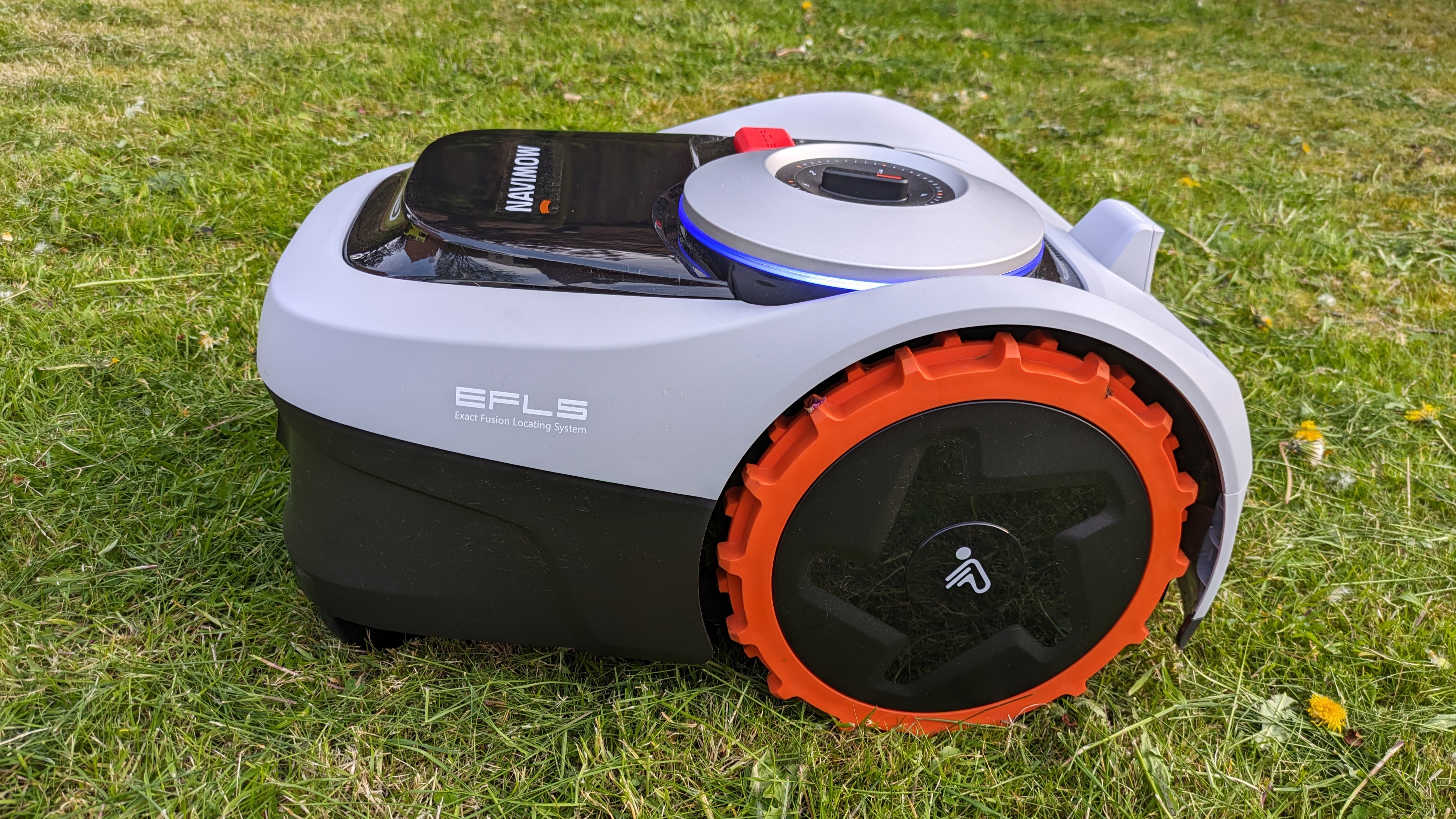
The robot itself is very stoutly built, with hard, chunky plastic throughout. It's a classic, front-heavy, bug-like robotic mower design that shares some design DNA with previous models from Flymo and Gardena.
A digital display on the top face of the robot gives you some essential status info, including the current charge state (0-100). The mower also has a circular LED status indicator, giving you a quick, colorful read on the robot’s performance status. To keep you in the loop while the robot is powering up, the charging station also shows a status indicator light, which shines brightly even in sunny weather. You activate the mower via its ‘Okay’ button. Providing its on-board battery has enough charge, it’s ready to mow almost as soon as you turn it on – just wait for the bleep.
One of the great things about the i105N is that it’s very ‘plug-in-and-play’ relative to most models. You don’t need a robotics diploma to learn how to use it. But for feature-focused users, there are plenty of advanced capabilities, including scheduled mowing, weather adaptivity, and an anti-theft alarm.
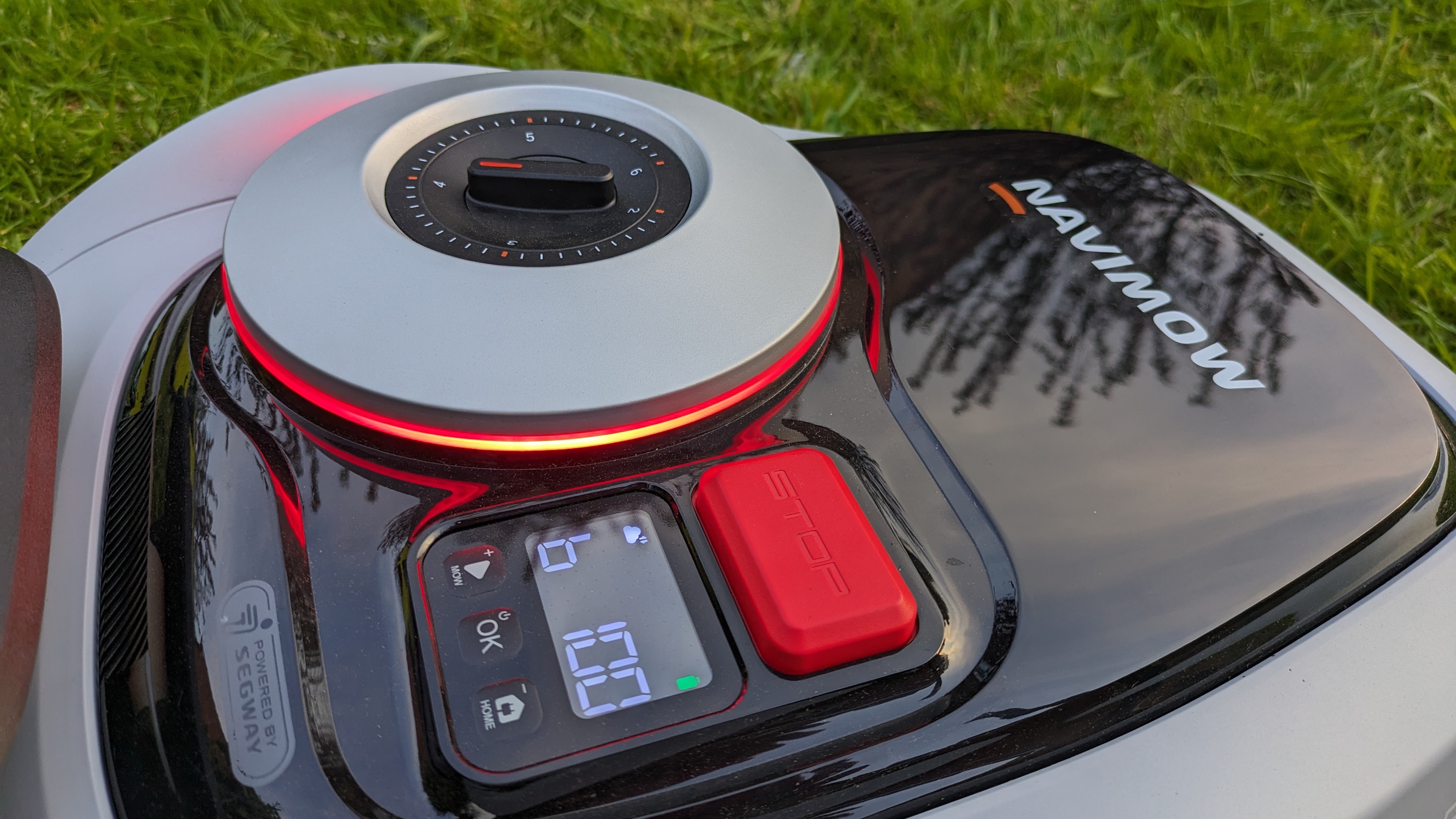
The i105N is not the easiest robotic mower to pick up, with no handles or grips around the outside. Eventually, I discovered the carry handles on the robot's underside, at the front end, and using these made it easy to carry either one-handed or two-handed.
Please don’t reach right under the mower while trying to find the carry handles, as the mower’s trio of cutting razors is also located on the underside, towards the center. With this in mind, the location of the handles (and blades) could be signposted more clearly.
Studying the underside of the mower will give you an idea of how it moves and mows. There are three razor-sharp cutting blades, which are spun to mow the grass and allow the cuttings to fall back onto the lawn. Be careful not to touch these sharp blades. Also on the mower’s underside are its hefty drive wheels, which have an intense tread to assist with traversal, and a pair of trailing caster wheels for stability. This two-wheel-drive design will suit most lawns but may lead to difficulties with traversal in poor conditions.
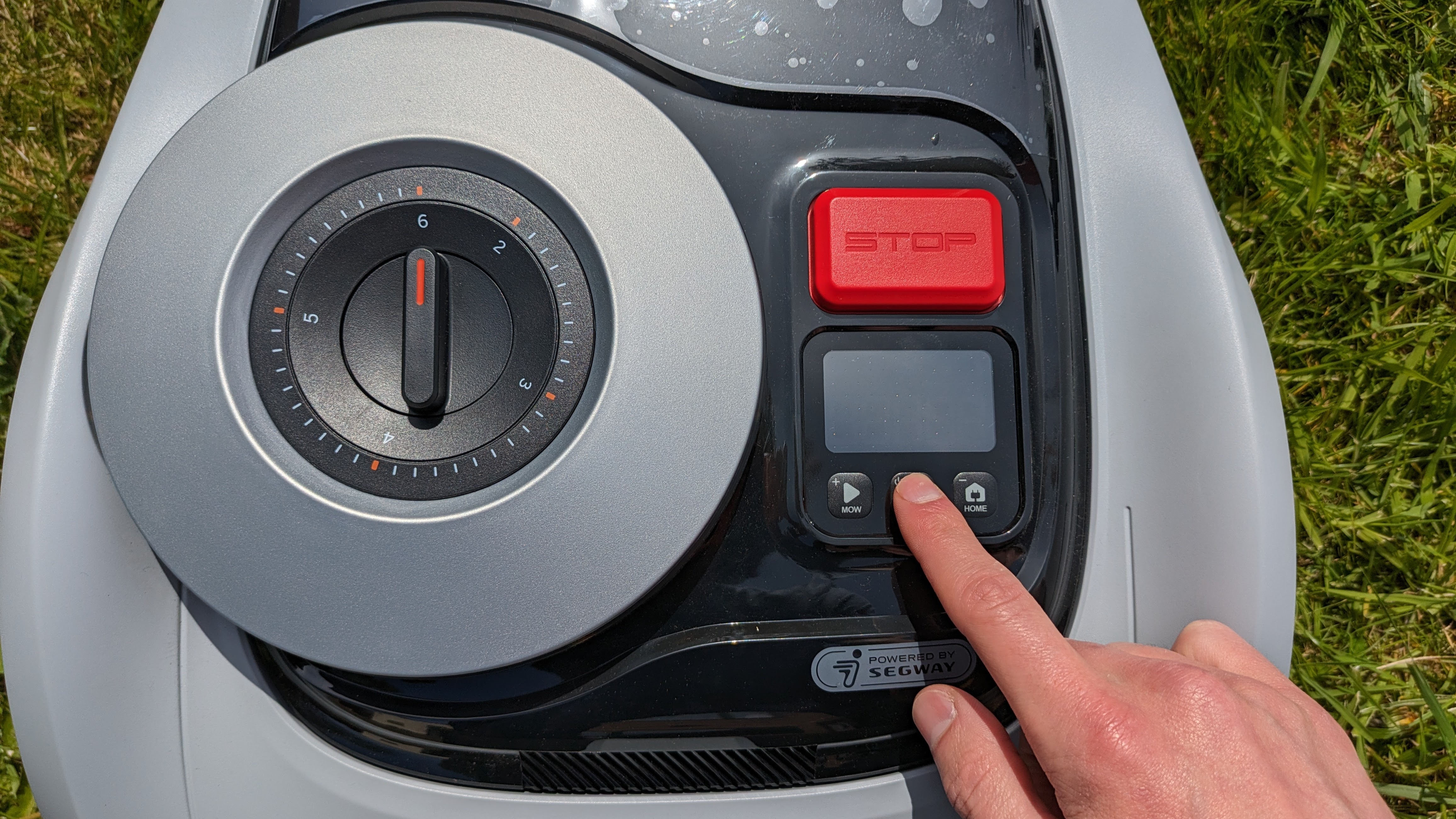
Segway Navimow i105N: Performance
I was super-impressed with the i105N's mowing performance throughout a testing period lasting several weeks. The robot effectively mowed the grass and navigated flawlessly using its wire-free, antenna-assisted navigation.
There was just one teething problem during the first use. Soon after starting the robot up, I identified that I’d made a slight error during setup: the charging station wasn’t on a suitably flat surface, so the treads on the mower’s wheels were sliding off the grips on the charging station. It turns out that the i105E has a very low tolerance for incline in this context, so I moved the base to a more suitable location.
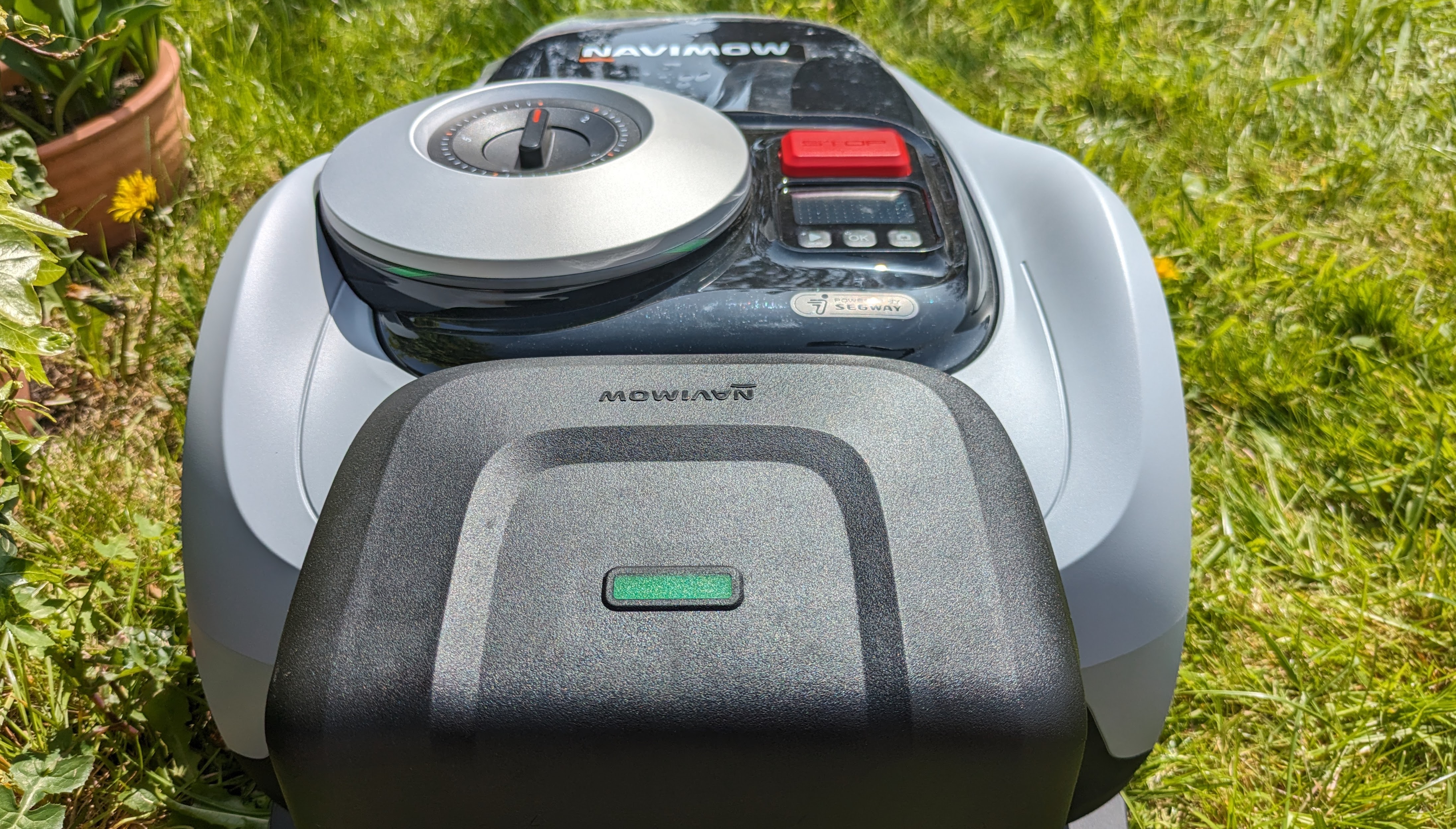
The first time you use your I Series robotic lawn mower, it’ll ask you to map out its ‘work area’ so that it will only go where you want it to. You do this by using your smartphone to remote-control the mower around the lawn, which is great fun once you’ve gotten the hang of it.
I steered the mower carefully around the perimeter of the lawn, avoiding obstacles such as plant pots and trees. Using the steering controls correctly takes some practice, but ultimately, the app-based control works effectively. It’s a little bit like driving a remote control car.
For users with multiple lawn areas, there’s an option to designate passages that the robot can use to traverse from one lawn to another. You can also mark off-limit islands on the lawn map, such as mid-lawn flower beds and ponds, and set vision fence-off zones, which prevents the robot’s collision avoidance camera from operating while the mower is facing a place you don’t want it to ‘see’.
While mapping your lawn area, remember that the mower needs some clearance to turn its back end, which protrudes a little. You can't mow right up to the edge of obstacles.
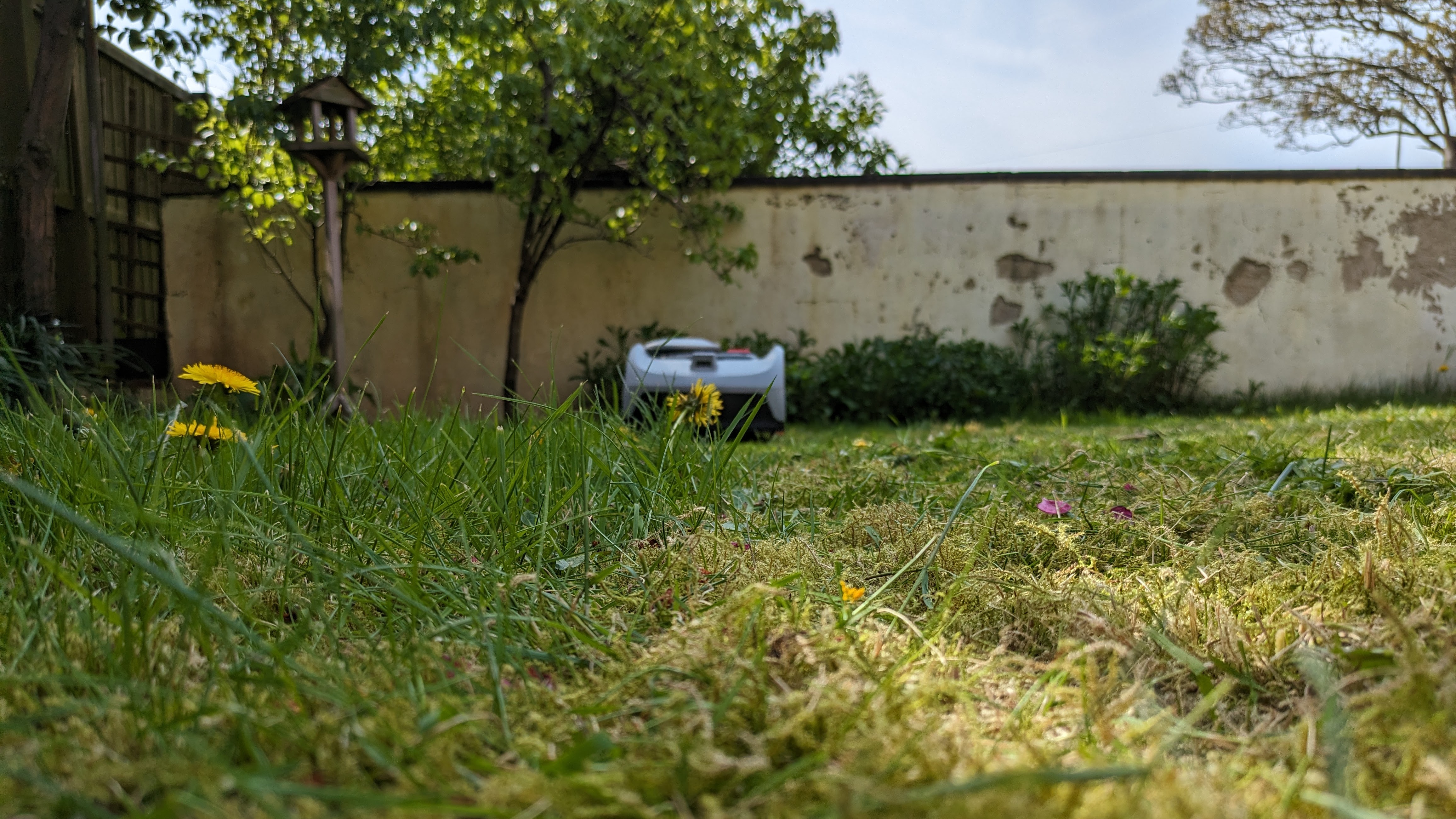
Robotic lawnmowers often work slowly, requiring several passes to cut the grass effectively. In my testing, the i105N mowed more like one of the best lawnmowers, producing an impressively clean cut at the first attempt. It even proved capable of cutting weeds such as dandelions and the grass itself.
Of course, as there is no grass collector, the cut grass just falls back onto the lawn—which is fine if you’re happy for grass cuttings to act as mulch, but not ideal for users who prefer a super-smart lawn.
The mower operates really quietly, at about 60 decibels, according to my sound meter. That’s about as loud as a subdued conversation. You can tweak the cutting height in very fine increments using a manual selector dial on the top of the machine, which runs from 2 - 3.6". This allows you to keep your lawn more natural or have it clean-cut. During my testing, changing the cutting height created a pleasingly noticeable difference at the various height settings I tried.
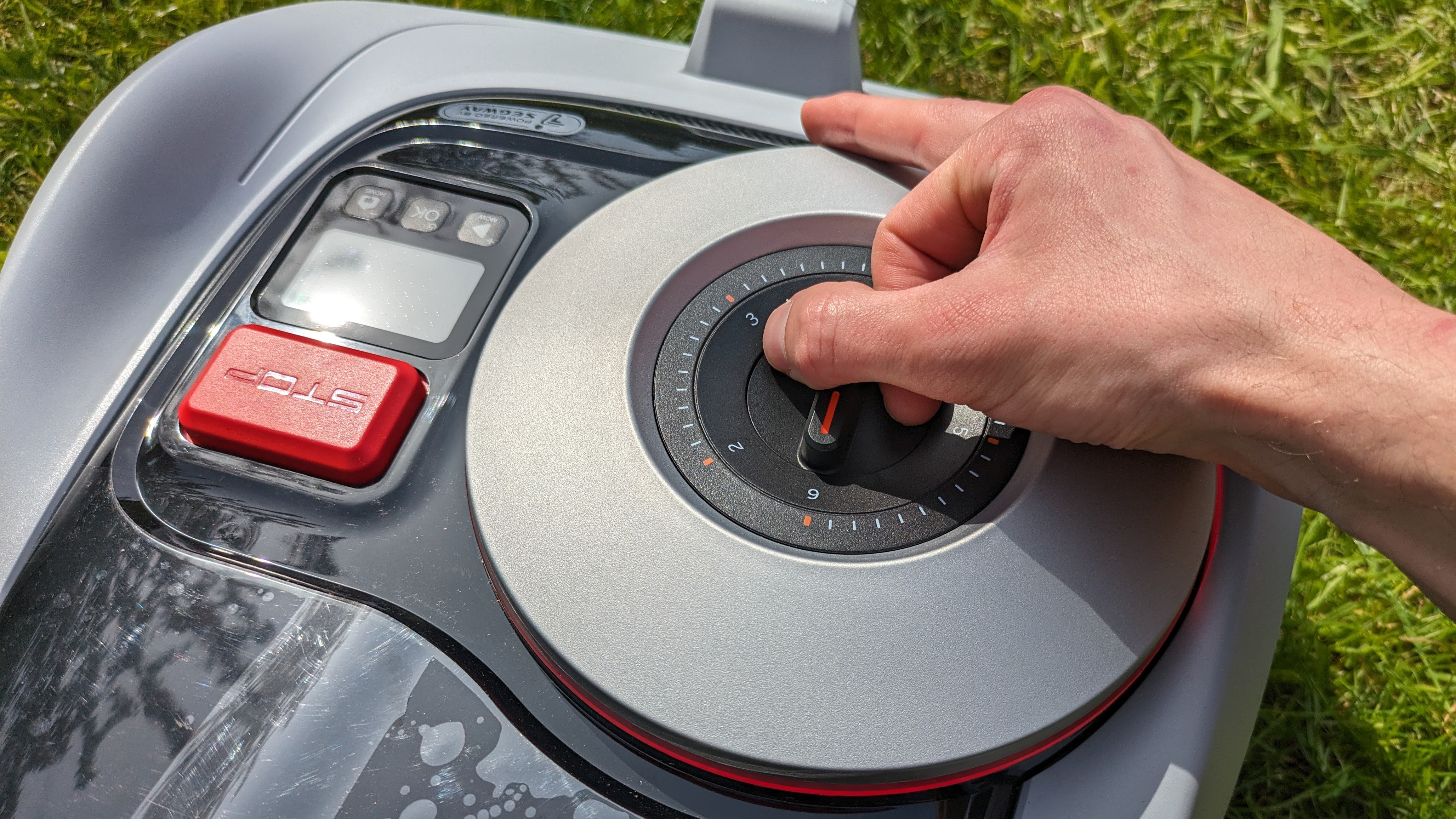
In terms of collision avoidance, the i105N performed excellently during our testing. I tried standing in its way during mowing, and the robot simply stopped and steered away. It makes a fairly loud beeping noise when it’s about to start, which should help you avoid any surprise collisions during start-up.
As with any robotic lawnmower, you can't use the i105N right up to the very edge of your lawn. So, you might leave the lawn borders longer as a ‘rewilded’ area, or you could use a string trimmer to cut those more unruly areas.
On the lawn, the robot seemed to have no problems traversing bumpy patches or gentle slopes. It stuck to the boundaries I’d created in the app tremendously well.
Throughout testing, the i105N's battery life seemed more than adequate. Each time it fully mowed my relatively small lawn, it used up about a quarter of its charge.
Segway Navimow i105N: Maintenance
Any devoted lawn mower owner knows it's a good idea to clean the underside of these machines from time to time—this applies to robotic mowers as well as manual ones.
Upend the i105N occasionally and brush away dry grass cuttings while keeping clear of the sharp blades at the center. Thanks to its IP66-rated weather resistance, you can also rinse the mower with water.
The blades should be replaced periodically to ensure optimal mowing performance. It's a simple job, but you will require a crosshead screwdriver to install or uninstall the components.
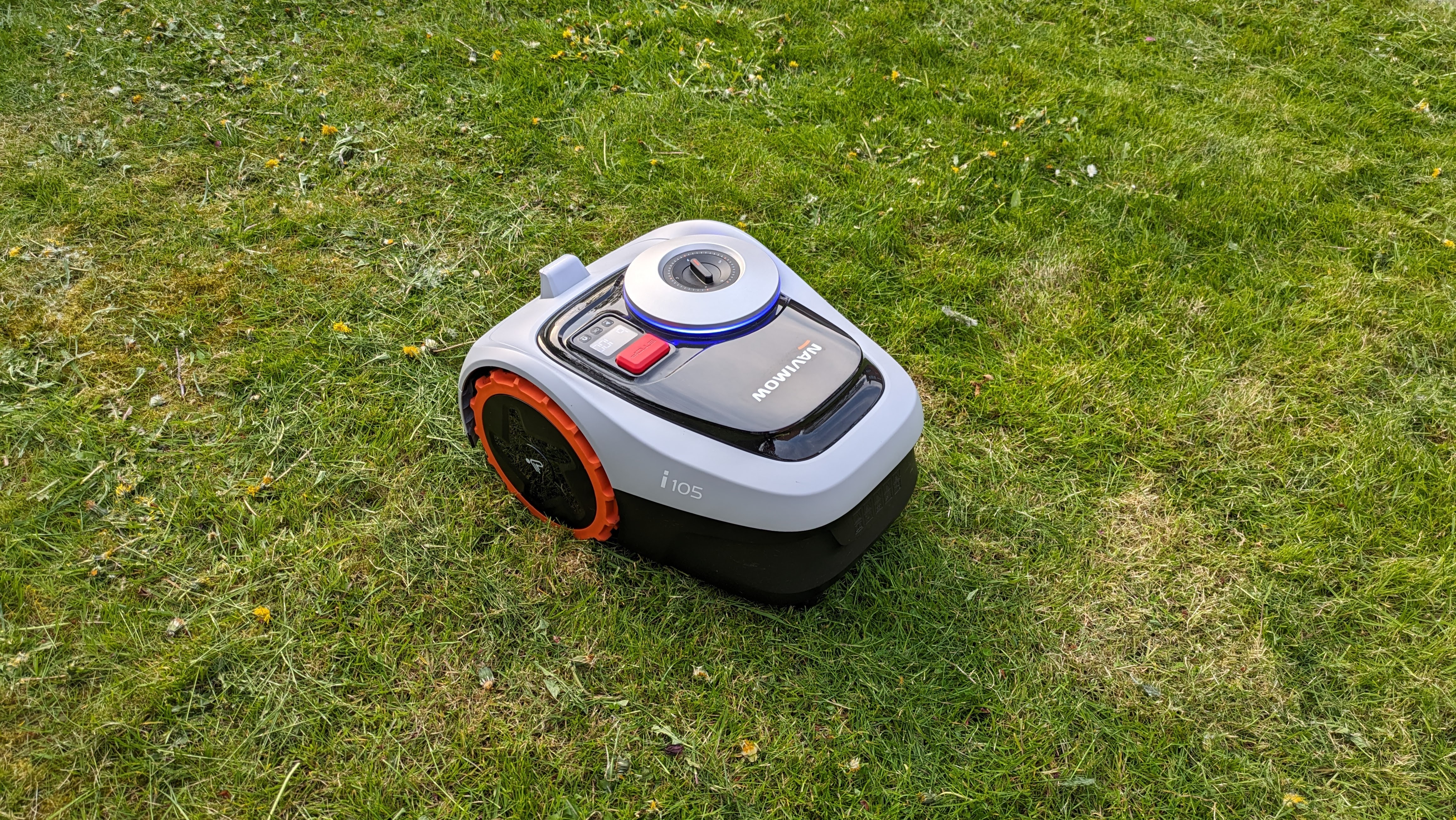
Segway Navimow i105N: User reviews
User ratings of the Navimow i105N are consistently excellent, which aligns with my experience during testing.
Amazon customers in the U.S. have awarded the mower an average rating of 4.4 stars, with many reviewers praising its high build quality and ease of use.
Encouragingly, users also rated the i105N highly for value-for-money, which is impressive given the mower's $999 price tag.
Would I buy the Segway Navimow i105N?
| Attribute | Notes | Score |
|---|---|---|
| Navigation | GPS and an antenna to map out and mow the lawn without perimeter wires; easy to adjust mowing boundaries and no-mow areas via the app; navigates well around obstacles and adheres to set boundaries | 9/10 |
| Cutting Performance | impressive cutting performance, providing a clean cut on the first pass and effectively handling weeds; cutting height is adjustable; does not collect grass clippings | 8/10 |
| Battery Life and Charging | adequate for small to medium-sized lawns, using about a quarter of its charge per mowing session; charging station must be placed on a perfectly flat surface | 8/10 |
| Noise Level | about 60 decibels, the Navimow i105N is relatively quiet, comparable to a subdued conversation | 9/10 |
| User Interface | app provides an intuitive user interface; scheduled mowing, weather adaptivity, and anti-theft alarms; app-based control for mapping the lawn | 9/10 |
Buy it if...
Don't buy it if...
How does the Segway Navimow i105N compare?
The Segway Navimow i105N (or the i105E in the UK) instantly ranks as one of TopTenReviews' most highly recommended robotic lawn mowers.
That said, this is not the only robotic mower worth considering. Another wire-free option is the Luba AWD 5000, which offers superior traversal capabilities but lacks the i105N's precise navigation.
Meanwhile, if you love the sound of the i105N but your lawn is closer to 1/4 acre in size, you should pick the Segway Navimow i110N instead.
If you're having trouble choosing a model, check out our guide on choosing a robotic lawn mower.
How I tested the Segway Navimow i105N
- Used rigorously for several springtime mows
- Challenged with mowing around an irregular boundary, avoiding obstacles such as trees and plant pots
I tested the Segway Navimow i105N by setting the robot and its accessories up on my lawn and using it for several mows during spring 2024. The model is nearly identical to the i105E, sold in the UK.
Because the i105N's key selling point is its wire-free boundary mowing, I looked closely at its navigational capabilities and ease of setup. Read more about how we tested.
